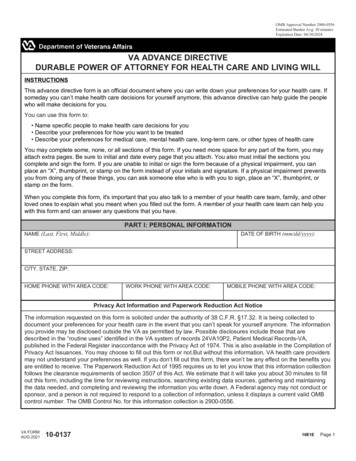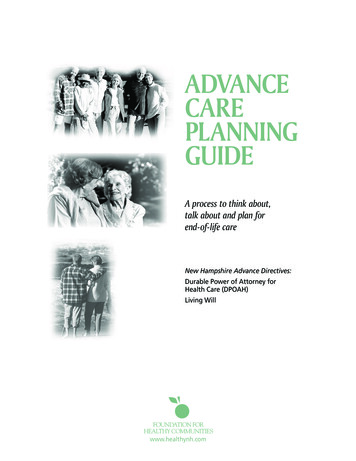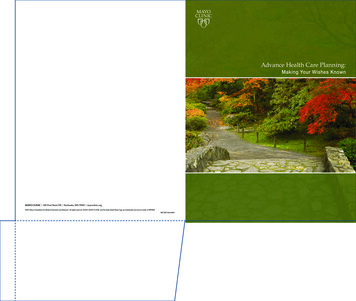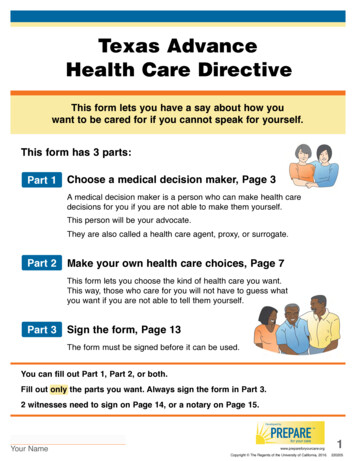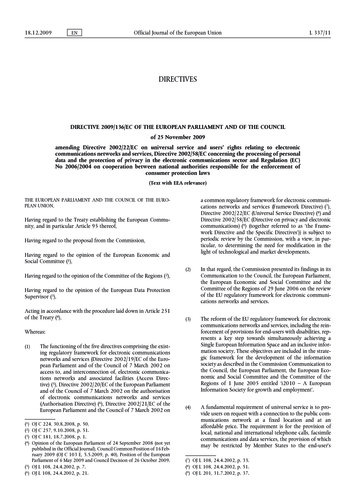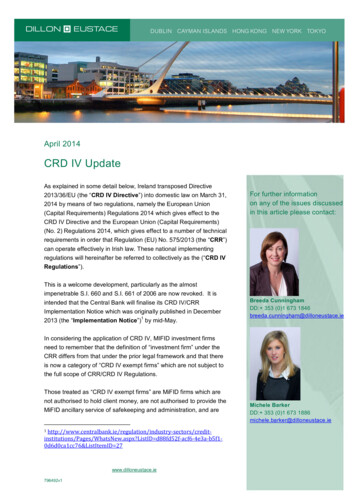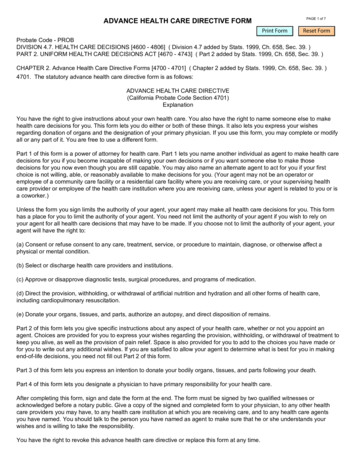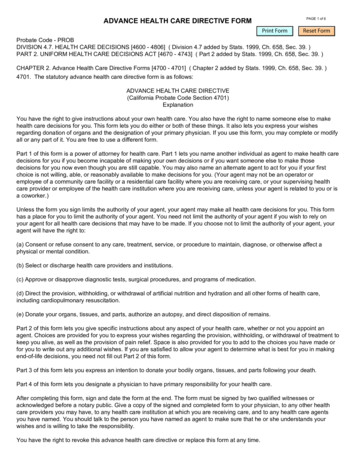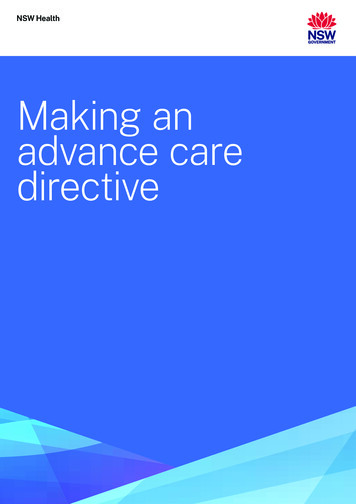
Transcription
NSW HealthMaking anadvance caredirective
NSW Ministry of Health1 Reserve RoadST LEONARDS NSW 2065Tel. (02) 9391 9000Fax. (02) 9391 9101TTY. (02) 9391 9900www.health.nsw.gov.auThis work is copyright. It may be reproduced in whole or in partfor study or training purposes subject to the inclusion of anacknowledgement of the source.It may not be reproduced for commercial usage or sale.Reproduction for purposes other than those indicated aboverequires written permission from the NSW Ministry of Health. NSW Ministry of Health 2022SHPN (OCHO) 220137ISBN 978-1-76023-112-5Further copies of this document can be downloaded from theNSW Health website www.health.nsw.gov.auMay 20223Making an Advance Care Directive
Making an Advance Care DirectiveThe purpose of this Information Booklet is to provide information to helpyou complete your Advance Care Directive. An Advance Care Directive formis provided at the end of the booklet, for you to complete and tear off.An Advance Care Directive is an importantway of letting people know your wishes aboutyour healthcare and treatment should you findyourself in a position where you are seriously illor injured and not able to make decisions. Havingan Advance Care Directive will make it easier foryour loved ones and health staff if they need tomake decisions for you.An Advance Care Directive is an important resultof Advance Care Planning.For more information about Advance CarePlanning, please see health.nsw.gov.au/patients/acp/Pages/default.aspx and t is an Advance Care Directive?An Advance Care Directive is a way to say whathealthcare treatments you would like to haveor refuse, should you be in a position where youare seriously ill or injured and unable to makeor communicate decisions about your care andtreatment.An Advance Care Directive can only be made byyou as an adult with decision making capacity.If it is valid, it must be followed. Healthprofessionals and family members have noauthority to override a valid Advance CareDirective.This booklet will helpguide you throughdecisions that you maywish to consider whenmaking an AdvanceCare Directive.An Advance Care Directive may include one ormore of the following: the person you would like to make medicaldecisions for you if you are unable to makedecisions details of what is important to you, such as yourvalues, life goals and preferred outcomes the treatments and care you would like orwould refuse if you have a life-threateningillness or injury.Why is an Advance Care Directiveimportant?Making an Advance Care Directive is an importantpart of Advance Care Planning.None of us know what will happen in the future orcan predict what might happen with our health.Medical advances mean that there are treatmentswhich can keep you alive when you are seriouslyill or injured, and which may prolong your life.Some people have firm ideas about how theywant to live the rest of their life, includingconditions or treatments that they might findunacceptable.In a crisis your family may find it difficult todecide what treatment is best for you. AnAdvance Care Directive will help your family anddoctors to know what you would want when youare not able to tell them yourself. It’s best to writeyour Advance Care Directive so that your wishesare clearly recorded.Making an Advance Care Directive1
How do I prepare for making anAdvance Care Directive?The first step is to think about what would beimportant to you at end of life and what mattersto you – your values. This may include: thinking about what kind of care you would liketo receive or refuse who you would like to make decisions on yourbehalf and where you would like to be cared for if youwere dying.In the Advance Care Directive form at the backof this booklet, Section 2 includes space foryou to write some statements if you wish. Thereis no right or wrong answer – it is up to you toidentify what is important to let others know.This information will help your family and thosemaking decisions for you to understand whattreatment and care you want.Some examples of statements about values areprovided in the Common Terms section onpages 9–10.2Making an Advance Care DirectiveIf you’re not sure what you would want, or wouldlike to read more, the following websites mightbe helpful: Palliative Care Australia palliativecare.org.au MyValues myvalues.org.auThe next step is to talk with your family, friendsand health professionals.Talking to your family and friends can be difficult.You might start by saying that like writing a will,you are planning ahead for a time when you mightnot be able to make decisions about your health.Make it clear to your loved ones what treatmentsyou would accept or refuse if you are very unwell.Your doctors can help by explaining whattreatments you could include in your AdvanceCare Directive based on your current health. Theycan also make sure that what you write can beunderstood by a health professional.Working through the Advance Care Directive format the back of this booklet will help identify whatis important to you, and what you would like tolet your loved ones and healthcare providersknow about.
How do I make an AdvanceCare Directive?When does my AdvanceCare Directive apply?In NSW, an Advance Care Directive can be spokenor written.Doctors and health care professionals will onlylook at your Advance Care Directive if you areunable to make or communicate decisions aboutyour healthcare and treatment.Unlike in other states, in NSW there isn’t a specificform to use for an Advance Care Directive. AnAdvance Care Directive can simply be written ona piece of paper, not witnessed and still be legallyenforceable. However, signed Advance CareDirectives are the recommended way to ensurethat your wishes are recorded.If you want to make an Advance Care Directiveyou can choose to: use the Advance Care Directive form developedby NSW Health at the back of this booklet write a letter or statement about your wishes tell someone that you trust and who knowsyou well.Deciding who will make decisionsfor you if you cannot make them.It is important to think about who you wouldlike to make healthcare decisions for you if youare seriously ill or injured and can no longermake decisions. Some people choose a familymember or close friend or appoint an EnduringGuardian/s.If it’s not clear in your Advance Care Directivewho this person or people are, your doctor willask someone else to make the decision for you.This person is known as the Person Responsible.A Person Responsible is not always a relative. Youmay also hear people use the term SubstituteDecision Maker.Your Person Responsible must refer to yourAdvance Care Directive before making anymedical or health decisions.Before acting on any instructions that yourAdvance Care Directive may contain about yourtreatment or care, doctors will assess if it is valid.Part of that assessment is understanding whetherit applies to your current situation.For example, if you were admitted to hospitalbecause you had fallen over and hit your headand had concussion, and were not able tocommunicate your wishes, you would be expectedto get better and parts of your Advance CareDirective that relate to end of life care may not beconsidered to apply to that situation.However, if you had suffered a major strokeor heart attack and were unconscious and notable to communicate, and were not expected toget better, the doctors may consider that yourAdvance Care Directive may apply inthat situation.Pain relief and managing discomfort are alwaysimportant. If your Advance Care Directive statesyou want to die a natural death, you will still begiven pain relief if needed.Further information about these terms is providedin the Common Terms section on page 9.Making an Advance Care Directive3
When is my Advance CareDirective valid?Where should I keep myAdvance Care Directive?An Advance Care Directive will only be used whenyou do not have capacity to decide for yourself orto communicate your wishes.You should keep your Advance Care Directive in aplace that is easy for you or someone else to findit. It is a good idea to keep a copy with you, or tokeep a card in your wallet that lets people knowthat you have an Advance Care Directive andwhere it can be found.Your doctor will consider your Advance CareDirective to be valid if: you had capacity when you wrote it it has clear and specific details abouttreatments that you would accept or refuse it applies to the situation you are in at the time.The NSW Supreme Court has said that validAdvance Care Directives must be followed.This is because they are a part of a person’sright to make decisions about their health.If an Advance Care Directive is valid, it mustbe followed. Health professionals and PersonsResponsible have no authority to override avalid Advance Care Directive.4Making an Advance Care DirectiveIt is a good idea to leave a copy with your PersonResponsible, family and/or carer, doctor and/orhealthcare facility.Make sure you know where all the copies are. Ifyou change your Advance Care Directive, you willneed to replace all of the copies.
Frequently Asked QuestionsCan I record my wishes regardingfuture healthcare in my will?What if I change my mind aboutmy Advance Care Directive?No. Your will only starts to operate after yourdeath. Any information about your health inyour will will not be available to your PersonResponsible or doctor(s) while you are alive.You can change your Advance Care Directive asoften as you like, as long as you have capacity.It is a good idea to read over anything you havewritten once a year, to make sure it is still current.Can someone appointed as my Powerof Attorney consent to medical anddental treatment on my behalf?If you change your Advance Care Directive,you should make sure you let people know andreplace all of the copies with the new AdvanceCare Directive.No. Their role is to manage your business,property and financial matters.Is an Advance Care Directivepermission or consent for euthanasia?No. You cannot request or direct a doctor orany other person to actively and deliberatelyend your life.I prepared an Advance Care Directivewhen I lived interstate. Is thisrecognised now that I live in NSW?Yes. Advance Care Directives made in otherAustralian states and territories are recognisedin NSW.I have an Advance Care Directive buthave decided that I would like myEnduring Guardian to make the bestdecision they can at the time. Can Irevoke my Advance Care Directive?What’s the difference betweenan Advance Care Directive andan Advance Care Plan?An Advance Care Directive can only be made byyou as an adult with decision-making capacity. Ifit is valid, it must be followed. No one can overrideyour Advance Care Directive, not even your legallyappointed guardian.An Advance Care Plan can be written by youor on your behalf. It documents your valuesand preferences for healthcare and preferredhealth outcomes. The plan is prepared fromyour perspective and used as a guide for futurehealthcare decision making, if you are unable tospeak or otherwise communicate your wishes foryourself.An Advance Care Plan may be developed for and/or with a person with limited capacity (ability tomake decisions), so therefore it does not need tobe followed.Yes, you can retract/cancel/void your AdvanceCare Directive at any time while you havecapacity. It is important to make sure you letpeople know you have revoked your Advance CareDirective and destroy all copies.Making an Advance Care Directive5
What is capacity?Capacity refers to an adult’s ability to make adecision for him or herself.Capacity is specific to the particular decision thatneeds to be made. In some circumstances, the lawsets out what tests must be met for capacity tomake certain decisions, for example to consent tomedical treatment.Generally, when a person has capacity to makea particular decision they can do all of thefollowing: understand and believe the facts involved inmaking the decision understand the main choices weigh up the consequences of the choices understand how the consequences affect them make their decision freely and voluntarily communicate their decision.Can I insist on being given a particulartreatment or procedure?No. Your health care team will consider yourwishes, but does not have to offer you treatmentthat may not benefit you.What about organ and tissue donationfor transplantation?Organ donation is a life-saving and lifetransforming medical process. Organ and tissuedonation involves removing organs and tissuesfrom someone who has died (a donor) andtransplanting them into someone who, in manycases, is very ill or dying (a recipient).People 16 years of age or older can register theirdonation decision with the Australian Organ DonorRegister. Details on how to register your decisioncan be found at ister or by visiting a governmentservice centre. Decisions can also be changed atany time.6Making an Advance Care DirectiveIt is important that you let your family knowyour decisions about organ and tissue donation.In Australia your family will always be asked toconfirm your donation decisions before organ andtissue donation can proceed.Some patients are so severely injured or illthat they do not respond to lifesaving medicaltreatments. The doctors caring for that patientmay agree that they will not survive and thatfurther medical treatment is no longer of anybenefit to them.The doctors may then ask their family about thatperson’s wishes about organ and tissue donation.If the person had indicated that they wanted tobecome an organ and tissue donor after theirdeath, the doctors may also ask the familyabout several treatments which may be givenbefore that person dies, only for the purpose ofimproving the function of any donated organswhen transplanted. These treatments are of nomedical benefit to the patient and are calledantemortem interventions. Examples includeantibiotics, blood thinning drugs or drugs tocontrol blood pressure.If you want to be an organ donor, the AdvanceCare Directive asks you to declare your consent toantemortem interventions.If you do not consent to antemorteminterventions, it is still possible to be an organdonor.
I’ve heard about body donation– what is that?Body donation is where a person’s body is givento a body donor program and / or a licensedanatomical facility either following the person’swritten consent prior to their death or with theconsent of their senior available next of kinafter their death. Bodies maybe used for theteaching of medical and health students, trainingof surgeons in new surgical techniques or forresearch.Most body donation programs encourage peopleto register to be an organ donor as well as abody donor, if they would like to do so. Where aperson has consented to body donation and organdonation, preference is given to organ donation ifsuitable, because of its life saving benefits.If you have registered your wish to donate with abody donor program you should make sure thatyour family knows your decision. That way eitheryour family or hospital staff can contact theprogram you are registered with when you die.In NSW a body donation program is usuallyorganised through a university or medicalresearch facility.Making an Advance Care Directive7
An Advance Care Directive is animportant way of letting people knowyour wishes about your healthcare andtreatment should you find yourself in aposition where you are seriously ill orinjured and not able to make decisions.8Making an Advance Care Directive
Common TermsAdvance Care PlanningAdvance Care DirectiveAdvance Care Planning involves thinking aboutwhat medical care you would like should you findyourself in a position where you are seriouslyill or injured and cannot make or communicatedecisions about your care or treatment. It includesthinking about what is important to you - yourvalues, beliefs and wishes.An Advance Care Directive is a way to say whathealthcare treatments you would like to haveor refuse, should you find yourself in a positionwhere you are seriously ill or injured and unableto make or communicate decisions about yourtreatment and care.Advance Care Planning can include one or moreof the following: t alking with your family, carers and/or healthprofessionals developing an Advance Care Plan making an Advance Care Directive.Ideally Advance Care Planning happens early,when you are well and are able to understand thechoices available to you about your healthcareand treatment. However it can be done at anytime you have capacity.An Advance Care Plan records preferences abouthealth, personal care and treatment goals. It maybe completed by discussion or in writing.If you are able to make decisions about yourfuture healthcare, you can make an Advance CarePlan by yourself or together with people that youtrust and/or who are important to you.If you are not able to make decisions, an AdvanceCare Plan can be made by a family member orsomeone who knows you well, together with ahealth professional. It should include your knownwishes about treatment.An Advance Care Directive may include one ormore of the following: the person or people you would like to makemedical decisions for you if you are unable tomake decisions details of what is important to you, such as yourvalues, life goals and preferred outcomes the treatments and care you would like or refuseif you have a life-threatening illness or injury.Person ResponsibleIn NSW the Guardianship Act 1987 states thatthe Person Responsible is (in order):1. Your guardianThis is a person or people who have been legallyappointed to make medical and/or dentaldecisions for you. In some situations a guardianmay be appointed for someone, but most peopleare able to choose their own guardian.If you are 18 years of age or older and havecapacity, you can appoint an Enduring Guardian(you can appoint one or two). When you appointthe Enduring Guardian(s) you can decide whatmedical and/or dental decisions you would likethem to be able to make for you, if you do nothave the capacity to make the decision yourself.Making an Advance Care Directive9
Your Enduring Guardian must consider yourAdvance Care Directive before they make adecision.2. Your spouse, de facto or same sex partnerPerson with whom you have a close andcontinuing relationship.3. Your carerPerson who currently provides support to youor did before you entered residential care. Thisperson cannot be a paid carer. The carer supportpayment is not considered payment.Values statementsSome people may choose to record generalstatements about what is important to them their values, beliefs and wishes - on their AdvanceCare Directive or in their Advance Care Plan.The following values statements are providedas examples of what you may wish to include inSection 2 of the form (there is no right or wrong– it is entirely up to you what you record to letothers know):Beliefs and values:4. A close friend or relativeIt is important for me to be able to communicatein some way, even if I cannot speak.Person with whom you have an ongoingrelationship.Life has meaning when I can enjoy nature andwhen I can practise my faith.Substitute decision makerI value my privacy.A substitute decision maker is a person who isappointed or identified by law to make decisionsfor an individual whose decision makingcapacity is impaired. A substitute decisionmaker may be appointed by the individual (forexample appointing an Enduring Guardian ormaking a Power of Attorney), appointed for theindividual (for example a guardian appointedby the Guardianship Division), or identified as asubstitute decision maker for medical and dentaltreatment by the NSW Guardianship Act 1987‘Person Responsible’ hierarchy.Physical or mental health concerns that you maywant considered:I do not want to struggle to breathe.I do not want to be in pain.It is important to me that I spend time in mygarden.Other information that you would like considered:I would like to stay at home as long as it is not toohard on my family or the people caring for me.I would not like to die at home.I worry that my family or the people caring for mewill not know what to do.I want flowers in my room.Cultural, spiritual and/or social care:I would like prayer, religious or spiritual rituals inmy own language.I would like my music to be played.10Making an Advance Care Directive
NSW Health Advance Care Directive (ACD)SECTION 1YOUR DETAILS AND YOUR PERSON RESPONSIBLEFamily name:Given names:Date of birth:Address:I have been provided with and read the ‘Making an Advance Care Directive’ information booklet.Please tick if yesI have legally appointed one or more people as my Enduring Guardian/s and they are aware of thisAdvance Care Directive. Please tick if yesENDURING GUARDIAN 1ENDURING GUARDIAN 2Name:Home phone number:Mobile phone number:Email address:I have not appointed an Enduring GuardianIf, because of my medical condition, I am not able to understand and make decisions about mytreatment or can’t tell the doctors or my family, my Person Responsible as determined according tothe hierarchy within the NSW Guardianship Act (1987) isPERSON 1PERSON 2Name:Relationship:Home phone number:Mobile phone number:Email address:www.health.nsw.gov.au1
SECTION 2PERSONAL VALUES ABOUT DYINGInformation about your values is important as it is not possible for this document to cover allmedical situations. Information about what is important to you may help the person who is makingdecisions on your behalf when they are speaking to the doctors about your care and treatment.In this section you can include: things that are important to you at the end of life (your beliefs and values) issues that worry you, and personal, religious or spiritual care you would like to receive when you are dying.If you do not want to complete this section, you should sign the bottom of the section on page 3If I am unable to communicate and not expected to get better: I would like my pain and comfort managed; and when deciding what treatments to give to me or not to give me, I would like the person/peoplemaking health decisions for me to understand how the following would make me feel (initialthe box that is your choice).If I am unable to communicate by any means, and not expected to get any better:UnbearableVALUESBearable(I would like treatmentdiscontinued and to beallowed to die a naturaldeath)Unsure1. If I can no longer recognise my family andloved ones, I would find life 2. If I no longer have control of my bladderand bowels, I would find life 3. If I cannot feed, wash or dress myself Iwould find life 4. If I cannot move myself in or out of bed andmust rely on other people to reposition(shift or move) me, I would find life 5. If I can no longer eat or drink and need tohave food given to me through a tube in mystomach I would find life 6. I f I cannot have a conversation with othersbecause I do not understand what people aresaying, I would find life www.health.nsw.gov.au2
SECTION 2PERSONAL VALUES ABOUT DYINGAt the end of my life when my time comes for dying, I would like to be cared for, if possible(initial the box of your choice)At homeIn a hospitalOther location (e.g hospice, residential aged care –please provide details)I do not know. I am happy for my Person Responsible/family to decide.When my Person Responsible is making decisions about care at the end of my life, I would likethem to consider the statements below.If you need extra space please attach an additional page.I do not want to complete Section 2:(Signature)www.health.nsw.gov.au3
SECTION 3DIRECTIONS ABOUT MEDICAL CAREThis section applies to when you are unable to make or communicate decisions about your healthcare and medical treatment, including CPR.If you are able to communicate you will be included in decisions about your care.If you do not want to complete this section, you should sign the bottom of this section.Cardio Pulmonary Resuscitation (CPR)CPR refers to medical procedures that may be used to try to start your heart and breathingif your heart or breathing stops. It may involve mouth to mouth resuscitation, very strongpumping on your chest, electric shocks to your heart, medications being injected into yourveins and/or a breathing tube being put into your throat.CPRIf I am not expected to recover, or if my life is unbearable as indicated in my Personal Values AboutDying, Section 2 on page 2, THEN, if my heart or breathing stops (please initial one box only):I would accept CPRORI would not accept CPR. Do not try to restart my heart or breathingOTHER MEDICAL TREATMENTSIf I am not expected to recover, or if my quality of life is unbearable as indicated in the table myPersonal Values About Dying, Section 2 on page 2 and 3, THEN the following treatments wouldbe UNACCEPTABLE to me (initial the box/boxes that apply to your wishes):Artificial ventilation through a tube (also called ‘life support’,‘breathing machine’)Renal dialysis - (kidney function replacement)Life prolonging treatments that require continuous administration of drugOTHER (e.g. food and fluid through a tube). Please list below:Even if I am expected to get better I would never want the following medical treatments:I do not want to complete Section 3:(Signature)www.health.nsw.gov.au4
SECTION 4SPECIFIC REQUESTS FOR ORGAN, TISSUE AND BODY DONATIONIf you do not want to complete this section, you should sign the bottom of this sectionMy wishes about organ, tissue and body donation for transplantation following my death are(initial your choice for each statement):YesNoI would like to donate my organs and tissues for transplantationfollowing my death.I have discussed my organ and tissue donation wishes with my familyand friends and they are aware of my decision.I would like to, or have already made arrangements to, donate my bodyfor education and/or scientific research.Antemortem interventions for organ donation (treatment/s immediately before my death only forthe purpose of organ donation)YesNoIt is my wish to donate my organs for transplantation after my death. If Iam dying, I consent to the doctors providing treatments for my organsbefore my death (including artificial ventilation, insertion of intravenouslines and administration of medications) intended only for the purpose ofenabling me to donate my organs and tissue for transplantation.I do not want to complete Section 4:(Signature)www.health.nsw.gov.au5
SECTION 5AUTHORISATIONPERSONAL DETAILSBy signing this document, I confirm that: I have read the accompanying information booklet, or had the details explained to me. I understand the facts and choices involved, and the consequences of my decisions. I am aware that this Advance Care Directive will be used in the event that I cannot make orcommunicate my own health care decisions. If I am able to communicate, I will be asked tomake decisions about my care. I have completed this Advance Care Directive of my own free will.//(Date)(Signature)DETAILS OF WITNESS*I confirm thatsigned this document onSigned:Name (please print):Address:Phone://TREATING HEALTH PROFESSIONAL*Name:DesignationAddress:Phone:Email:I confirm that I had no reason to doubt the capacity of the personI confirm thathad capacityand was aware of the implications of the information in this Advance Care Directive. (Medicalofficer only)(Signature)//(Date)* While not legally required, it is strongly recommended that a witness co-signs this Advance Care Directive and/or ahealth professional witnesses you sign this form. Once completed this form is to be given to your Personal Responsible,Enduring Guardian and medical professionals.www.health.nsw.gov.au6
This page is intentionally left blank.Making an Advance Care Directive11
NSW Health website www.health.nsw.gov.au May 2022. An Advance Care Directive is an important way of letting people know your wishes about your healthcare and treatment should you find yourself in a position where you are seriously ill or injured and not able to make decisions. Having
